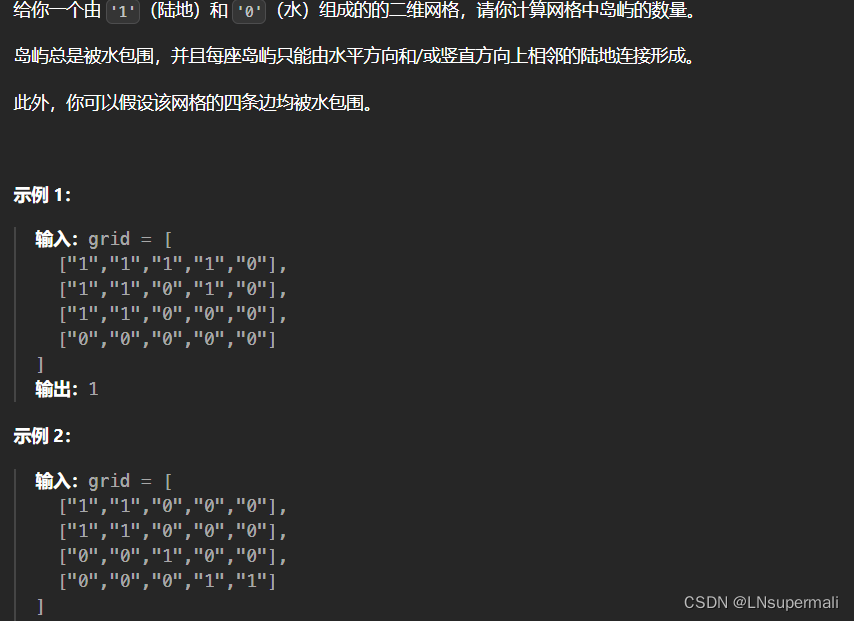Problem: 200. 岛屿数量
文章目录
题目描述
思路及解法
1.定义方向数组:定义一个方向数组 DIRECTIONS,表示上、下、左、右四个方向的移动。
2.获取网格的行数和列数同时初始化一个计数器 numIslands 用于记录岛屿的数量。
3.使用两层循环遍历整个网格,如果遇到一个未访问的陆地 '1',计数器 numIslands 增加1,并调用 BFS 方法来标记整个岛屿。
4.BFS方法:
4.1.创建一个队列 queue,并将当前陆地的位置加入队列。
4.2.将当前陆地标记为已访问,即将 grid[row][col] 设置为 '0'。
4.3.使用一个循环处理队列中的每个位置,遍历四个遍历四个方向,根据方向数组计算新位置。如果新位置是有效的且为未访问的陆地 '1',将其加入队列并标记为已访问。
复杂度
时间复杂度:
O ( M × N ) O(M \times N) O(M×N);其中 M M M和 N N N分别为举证grid的行数与列数
空间复杂度:
O ( M × N ) O(M \times N) O(M×N)
Code
java
class Solution {
// Define four directions: up, down, left, and right
private static final int[][] DIRECTIONS = {{-1, 0}, {1, 0}, {0, -1}, {0, 1}};
/**
* Number of Islands
*
* @param grid Given array
* @return int
*/
public int numIslands(char[][] grid) {
if (grid == null || grid.length == 0) {
return 0;
}
int rows = grid.length;
int cols = grid[0].length;
int numIslands = 0;
for (int row = 0; row < rows; row++) {
for (int col = 0; col < cols; col++) {
if (grid[row][col] == '1') {
numIslands++;
bfs(grid, row, col);
}
}
}
return numIslands;
}
/**
* @param grid Given array
* @param row The row of array
* @param col The column of array
*/
private void bfs(char[][] grid, int row, int col) {
int rows = grid.length;
int cols = grid[0].length;
Queue<int[]> queue = new LinkedList<>();
queue.offer(new int[]{row, col});
grid[row][col] = '0'; // Mark as accessed
while (!queue.isEmpty()) {
int[] current = queue.poll();
int currentRow = current[0];
int currentCol = current[1];
for (int[] direction : DIRECTIONS) {
int newRow = currentRow + direction[0];
int newCol = currentCol + direction[1];
if (newRow >= 0 && newRow < rows && newCol >= 0 && newCol < cols && grid[newRow][newCol] == '1') {
queue.offer(new int[]{newRow, newCol});
grid[newRow][newCol] = '0'; // Mark as accessed
}
}
}
}
}
